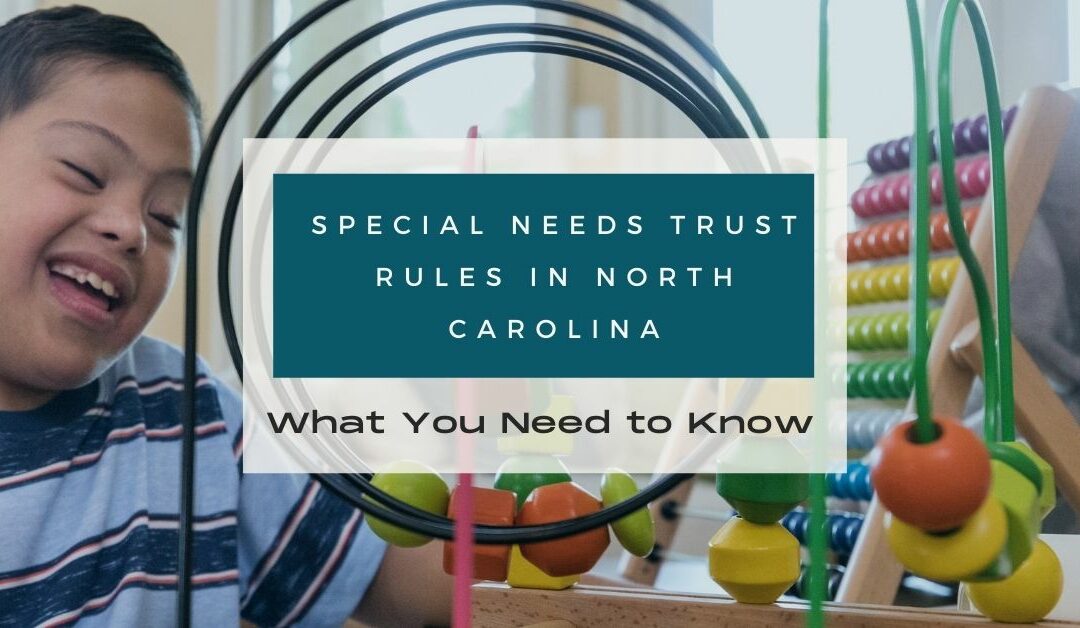If you have a loved one with special needs, you know just how important it is to provide for them long into the future. One way to do this is by setting up a special needs trust. However, special needs trust rules in North Carolina can be tricky, so it’s essential to understand how it all works before setting up your trust. In this blog post, we will look at the special needs trust rules in NC and explain what they mean for you and your loved one.
What is a Special Needs Trust in North Carolina?
You can set up a special needs trust to benefit a person with special needs. They can use the money in the trust to supplement the income they may receive from government benefits, such as Social Security and Medicaid.
There are income limit restrictions for eligibility to receive government benefits such as housing, transportation, and medical insurance. However, it’s important to note that special needs trusts are subject to specific rules so that the beneficiary (special needs individual) can continue receiving the government benefits.
What are the Special Needs Trust Rules in North Carolina?
One of the most critical special needs trust rules in NC is that the trustee cannot have direct control over the assets in the trust. This rule means that the trustee cannot use the money for their own purposes. Instead, they must follow the instructions laid out in the trust document when distributing to the beneficiary.
Another special needs trust rule in NC is that any money left over in the trust after the beneficiary’s death will reimburse the government for benefits they paid to the beneficiary during their lifetime.
Also, when drawing up a special needs trust, the trustee must be a North Carolina resident, 18 years of age or older, and they cannot be the beneficiary of the trust.
These are just a few of the special needs trust rules in NC that you need to be aware of before setting up your trust. It’s essential to consult with an experienced attorney to help you navigate the special needs trust process and ensure that your trust documents are correct. (1)
How Do You Set Up a Special Needs Trust?
You’ll need to do a few things when setting up your special needs trust. First, you’ll need to talk with an experienced estate planning attorney who fully understands how special needs trusts work. They can help you carefully draw up your trust documents according to NC law.
Next, you’ll choose a trustee. The trustee will manage the trust and handle beneficiary disbursements according to your trust documents.
Once you’ve done this, you’ll need to work with an attorney to draft a trust document that outlines how the trustee will handle the money in the trust and who will receive the funds after the beneficiary’s death.
You and your attorney can write the trust to take effect immediately, called an Inter Vivos or Living Trust. Alternatively, you can plan for the trust to take effect after you die as a part of your will, called a Testamentary Trust.
You’ll also need to decide how much money you want to put into the trust and work with your attorney to fund the trust. Without funding, the trust cannot operate as intended.
Once you’ve set up your special needs trust, it’s essential to review it regularly and make sure that it still meets your needs and the needs of your loved one. If you have any questions about special needs trust rules in NC, or if you need help setting up your trust, be sure to contact an experienced attorney who can assist you.
How Can the Beneficiary Use the Funds in a Special Needs Trust?
The money in a special needs trust can supplement the beneficiary’s income and help them cover the costs of things like:
- Housing
- Transportation
- Medical expenses
- Education
- Recreation
- Other Needs
It’s important to note that only the beneficiary benefits from the trust. The trustee cannot use the funds in the trust for their own personal benefit. The trustee must follow the instructions in the trust document when making disbursements to the beneficiary.
Understanding the Essentials of Special Needs Trust
Parents who are careful planners often draw up a special needs trust, also called a 3rd party trust to financially support their child without causing an interruption in Medicaid or SSI assistance.
While special needs trust rules in NC can seem complicated, they are put in place to protect your loved one’s interests. By understanding these rules and setting up your trust accordingly, you can ensure that your loved one will have what they need to live well.
We Can Help
If you have any questions about special needs trusts or want to learn more about setting one up for your loved one, contact our Hopler, Wilms, and Hanna estate planning attorneys today. We would be happy to answer any questions you have and help you set up your special needs trust. Find out how you can help your loved one live well long into the future.

